How to stop your dog chewing and mouthing
Training your dog to express this behaviour in a safe and acceptable way.

Chewing and mouthing are normal dog behaviours. So, we need to give our dogs plenty of opportunities to do this in a safe and acceptable way.
To stop your dog from chewing and mouthing things you don’t want them to, make it clear which things they can chew.
Why do dogs chew things?
Dogs and puppies use their mouths to explore the world around them and to play. This is commonly referred to as ‘mouthing’. They might especially chew or mouth when they’re teething, which normally lasts until they’re around seven months old. The problem is that sometimes they start chewing us or our belongings. Chewing the wrong things can be dangerous for them. They can also hurt us by accident or chew through our favourite pair of shoes.
Of course, they don’t understand they’re doing anything wrong. They just know it feels great to chew everything in sight. And because they like how chewing feels, they can often chew to make a stressful situation easier to deal with.
Seven steps to get your dog to stop chewing and mouthing
There are plenty of practical steps you can take to stop your pup from mouthing and chewing things they shouldn’t. Here’s some advice from our dog behaviour experts.
- Puppy-proof your living space: Make sure you remove prized possessions or put them out of reach. Restrict your puppy’s access around your home using child gates or a playpen, but always make sure they have fun and safe things to chew in their zone.
- Provide suitable toys and chews for your puppy to play with: Swapping your pup’s toys daily will keep them interested. Dogs enjoy chewing lots of different things, so try to mix it up with rope, rubber, and soft toys. Remember to praise them when they chew on the right thing. Joining in and having a game is a great way to reward them, and you might just have some fun too.
- Always keep a toy handy: Recognising signs that your puppy is getting ready to play, such as an increase in energy, bouncing, pouncing and batting things with their paws, means you can give them the toy before they start chewing or mouthing at you. This way you’re showing your puppy how to get it right from the start.
- Avoid rough and tumble wrestling games which involve biting: There’s a risk your puppy will expect to be able to play like this whenever they want and with whoever they want. Puppies need a consistent message that biting or mouthing us is never okay, otherwise they’ll be confused and could become worried or frustrated.
- Stop playing if your dog starts biting: If your puppy puts their teeth on you, stop what you’re doing and stay still. If they continue, turn away and cross your arms – a clear signal that your attention has been withdrawn.
- If this doesn’t work, move away, leaving them to calm down for a moment before going back. Once your puppy is calm you can praise them. Over time your puppy will learn that mouthing means the fun ends, so they will gradually stop doing it.
- Don’t tell your puppy off for mouthing or chewing: Telling a puppy off will only make them worried, and that could make their behaviour worse.
- Provide appropriate exercise, socialisation and mental stimulation: Your dog may be more likely to bite or chew things if they’re bored and not getting enough mental or physical exercise. For some great ways to keep your puppy busy in the right way, take a look at our activity ideas. These include suggestions for toys and chews, how to make homemade puzzle feeders and ways to engage your pup with fun training.
- Rest is also important – puppies are much more likely to mouth when over-tired – so make sure they have time to relax too.
More expert training advice
If you're struggling to teach your dog not to chew or mouth things, it might be worth enrolling in some dog training lessons. Our online Dogs Trust Dog School give practical training to help you and your pooch understand each other better.
Related articles

How to stop your dog resource guarding food and toys


